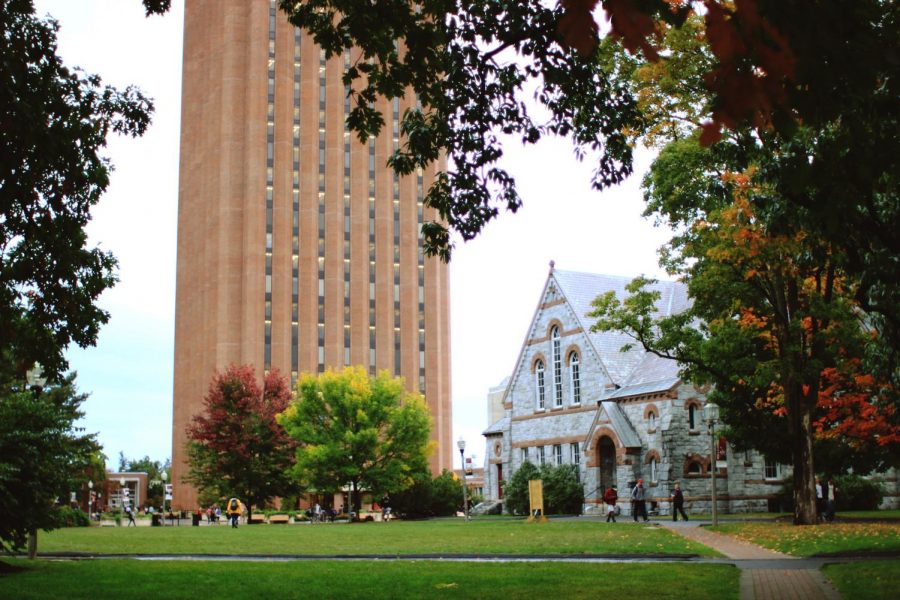The University of Massachusetts Fine Arts Center held a talk on Wednesday featuring Dr. Ibram X. Kendi, a famed professor and author who specializes on the topic of race and discrimination in America. Kendi discussed antiracism in response to recent events.
Kendi has had notable success as of recent years, becoming the youngest recipient of the National Book Award for Nonfiction with his book titled “Stamped from the Beginning: The Definitive History of Racist Ideas in America.” He additionally has contributed articles to publications such as The Atlantic, The New York Times and The Huffington Post.
Kendi took his expertise to UMass’s Fine Arts Center Concert Hall to speak in an event that was titled “How to be an Antiracist.”
“Many people are craving a concise message on how to be antiracist,” a page advertising the talk on the UMass website signaled about the event. “People are searching for candid directions about how to pour their passion into building an antiracist society.”
One of event coordinators, Lori Sadler, said that the goal of the talk was to “empower people on this campus to be better allies to marginalized groups … [including] people of color, LGBTQ+ people and people with disabilities.”
This topic resonates heavily at UMass in the wake of recent incidents of racism and discrimination on campus, such as the writing of a racist message on a bathroom mirror at Melville Hall that occurred in September.
“I understand that we’ve had some activity recently here,” Kendi addressed the crowd promptly after he took the stage. Kendi spoke with awareness regarding these recent incidents and hoped to educate and provide insight for those affected.
“It’s critical for us to recognize the purpose of racial terror; it makes people fear,” he began. “But, it’s important to consistently blame the policies, not the people.”
Kendi assured that he understood how egregious racist acts can be, which transitioned into him introducing the concept of ‘antiracism’ as a solution to resolve conflict.
“I’m going to talk about how not to be a racist, is that okay?” Kendi asked of the audience, as an approving applause quickly followed.
According to Kendi, by definition, antiracism “suggests racial equity by expressing likewise ideals and policies.” Thus, an ‘antiracist’ is a supporter of these two things.
Kendi proceeded to explain that this idea can be quite difficult to adopt in our society.
He said, “It’s hard for us to be antiracist because we are constantly presented with racist ideas, and many ideas suggest racial hierarchy or equality.”
He then described that such ideas translate over to our government and make their way onto legislation, masterminding the “racist policies” which “yielded racial inequality” in our society.
As the lecture wound down, the audience showed satisfaction with the talk and Kendi’s insights through immense applause.
Cameron Gibney can be reached at [email protected].




















SittingBull • Nov 8, 2018 at 2:57 pm
According to Kendi, by definition, antiracism “suggests racial equity by expressing likewise ideals and policies.” Ahhh, and there you have it. Who out there is expressing likewise ideals and policies? Who is even trying? All of these anti-white protests are inherently racist. Just look at the picture on the front page. Protesters are not trying to build an anti-racist or post-racial society? We can see that many of the “minorities” in the US come from the MOST racist places in the world and are motivated/emboldened by the current climate of Euro-caucasian self-hatred to overthrow the system and its ideals. In other words, get white people out. What happens then? Do you think we all get along in perfect harmony like the old Coca-Cola commercial? Of course not. The Asians are most racist people in the world against one another. The South Americans, Middle Easterners and Africans not far behind. It’s all overt. And now it’s come here but it’s directed against whites and people are falling for it. Please.
amy • Nov 8, 2018 at 1:51 am
I am guessing he was paid by Umass otherwise he would point out the RACISM here;. Umass in it’s words says everything its’ against racism, for diversity, tolerence, etc but those are just words; talk is cheap; the reality is that that this is a very racist college